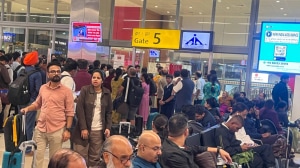Aatish Taseer’s new book is a reflective collection of essays that explores belonging through chronicles of his travels after 2019
Taseer matches his memories of the places from past visits with present-day sights, smells and sounds to make sense of a world transformed.
 The idea of home is a powerful well that we all dig into, no matter how fragmented our memories. (Source: Amazon)
The idea of home is a powerful well that we all dig into, no matter how fragmented our memories. (Source: Amazon)During one of my monthly catch ups with a friend, the idea of her protective bebe (grandmother in Punjabi) came up. She reminisced about the time when coolers were an unknown concept and how, as children, they would spend hot summer nights on the home’s terrace.
Every evening, the women of the house would drench the terrace floor with water to suppress the day’s heat. But summers back in the ’80s were also synonymous with severe dust storms, so bebe would do a little thing: She would place an upturned steel glass tumbler in the corner of the terrace before everyone went to bed. It was her way of alarming everyone so that when the winds became rough while everyone was sound asleep, the tumbler would fall, wake everyone up, in time to run back down.
The idea of home is a powerful well that we all dig into, no matter how fragmented our memories. It is that one thing that’s ours to hold on to and find comfort in. But what happens when you lose control over your memories, courtesy your country’s government?
In May 2019, journalist and writer Aatish Taseer wrote a cover story for the Time Magazine criticising Prime Minister Narendra Modi’s governance. The general elections were underway and after the PM got re-elected for the second time in a row, Taseer received the revocation notice of his Overseas Citizenship of India (OCI). Taseer, the son of Indian journalist Tavleen Singh and late Pakistani politician and businessman Salmaan Taseer, was accused of hiding the Pakistani origin of his father, a fact that is public information. In August 2019, he received a letter of intimation from the Home Ministry and, in November that year, was officially exiled from the country that he called home.
“To lose one’s country is to know an intimate shame, like being disowned by a parent, turned out of one’s home,” he writes in his latest book, A Return To Self: Excursions In Exile, a reflective collection of eight essays chronicling his travels after 2019 to cities and countries. He employs his memories of the places from the past with present-day sights, sounds and smells, to make sense of how things have changed, how he and his life have changed.
One of the strongest essays is the one that Taseer kicks off his authorial expedition with. The piece about his travel to Istanbul back in 2005 as a young man of 25, closeted and just about starting off as a writer, is a deeply personal account in which insecurities and pleasure run alongside his assessment of the city’s political state of affairs.
Then, in Sri Lanka, he comprehends the many interpretations of the “mud-born” lotus, in Mexico, rice — the post-Hispanic ingredient — and its supremacy in the country’s cuisine collides with its exiled Hispanic past. The winter afternoons spent at his grandmother’s home in Delhi as a teenager, evoke memories of an encounter with the attarwallah (family perfumer) and the scent of oudh.
One travels with Taseer to countries near and far as he, quite unabashedly, exhibits his erudition by quoting eminent authors like DH Lawrence, TS Eliot, Oscar Wilde, alongside relevant historians such as Ananda K Coomaraswamy, Edward Gibbon and Peter Hopkirk.
The promise of liberation is what travel brings to the table. Liberation from not just routine but from the tethered idea of belonging and the obligations that come with it. Taseer’s anthology reaffirms this unlearning that to be free, you must accept the impermanence of things. Of family, friends and, most importantly, the identity a nation might bestow upon you. For, the idea of an indestructible home is after all a beautiful illusion.
Mazumdar is a Delhi-based independent writer
- 01
- 02
- 03
- 04
- 05































